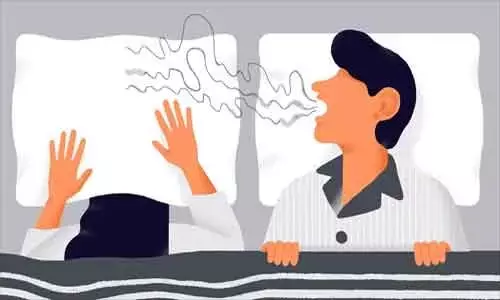- Home
- Medical news & Guidelines
- Anesthesiology
- Cardiology and CTVS
- Critical Care
- Dentistry
- Dermatology
- Diabetes and Endocrinology
- ENT
- Gastroenterology
- Medicine
- Nephrology
- Neurology
- Obstretics-Gynaecology
- Oncology
- Ophthalmology
- Orthopaedics
- Pediatrics-Neonatology
- Psychiatry
- Pulmonology
- Radiology
- Surgery
- Urology
- Laboratory Medicine
- Diet
- Nursing
- Paramedical
- Physiotherapy
- Health news
- Fact Check
- Bone Health Fact Check
- Brain Health Fact Check
- Cancer Related Fact Check
- Child Care Fact Check
- Dental and oral health fact check
- Diabetes and metabolic health fact check
- Diet and Nutrition Fact Check
- Eye and ENT Care Fact Check
- Fitness fact check
- Gut health fact check
- Heart health fact check
- Kidney health fact check
- Medical education fact check
- Men's health fact check
- Respiratory fact check
- Skin and hair care fact check
- Vaccine and Immunization fact check
- Women's health fact check
- AYUSH
- State News
- Andaman and Nicobar Islands
- Andhra Pradesh
- Arunachal Pradesh
- Assam
- Bihar
- Chandigarh
- Chattisgarh
- Dadra and Nagar Haveli
- Daman and Diu
- Delhi
- Goa
- Gujarat
- Haryana
- Himachal Pradesh
- Jammu & Kashmir
- Jharkhand
- Karnataka
- Kerala
- Ladakh
- Lakshadweep
- Madhya Pradesh
- Maharashtra
- Manipur
- Meghalaya
- Mizoram
- Nagaland
- Odisha
- Puducherry
- Punjab
- Rajasthan
- Sikkim
- Tamil Nadu
- Telangana
- Tripura
- Uttar Pradesh
- Uttrakhand
- West Bengal
- Medical Education
- Industry
Habitual snoring linked to significant brain changes in children

Children who regularly snore have structural changes in their brain that may account for the behavioral problems associated with the condition including lack of focus, hyperactivity, and learning difficulties at school. That is the finding of a new study conducted by researchers at the University of Maryland School of Medicine (UMSOM), which was published today in the journal Nature Communications.
The research was supported by the National Institute on Drug Abuse (NIDA) and nine other Institutes, Centers, and Offices of the National Institutes of Health.
To conduct study, the researchers examined MRI images collected from more than 10,000 children aged 9 to 10 years enrolled in the Adolescent Brain Cognitive Development (ABCD) study, the largest long-term study of brain development and child health in the US. UMSOM researchers are co-investigators in this ongoing study.
They found that children who snored regularly (three or more times per week), as reported by their parents were more likely to have thinner gray matter in several regions in the frontal lobes of their brain. These areas of the brain are responsible for higher reasoning skills and impulse control. The thinner cortex in these regions correlated with behavioral disturbances associated with sleep disordered breathing, a severe form of which is called sleep apnea. These behavioral problems include a lack of focus, learning disabilities, and impulsive behaviors. The snoring condition causes disrupted sleep throughout the night due to interrupted breathing and reduction in oxygen supply to the brain.
"This is the largest study of its kind detailing the association between snoring and brain abnormalities," said study lead author Amal Isaiah, MD, PhD, Associate Professor of Otorhinolaryngology--Head and Neck Surgery and Pediatrics at UMSOM. "These brain changes are similar to what you would see in children with attention deficit hyperactivity disorder. Children have loss of cognitive control which is additionally associated with disruptive behavior."
Up to 10 percent of American children have obstructive sleep disordered breathing, and a significant percentage are misdiagnosed as having ADHD and treated with stimulant medications.
Dr. Isaiah offered this advice to parents: "If you have a child who is snoring more than twice a week, that child needs to be evaluated. We now have strong structural evidence from brain imaging to reinforce the importance of diagnosing and treating sleep disordered breathing in children."
The condition can be treated with tonsillectomy and adenoidectomy, considered the first line of treatment of children with symptoms of snoring, breathing pauses during sleep, and mouth breathing.
"We know the brain has the ability to repair itself, especially in children, so timely recognition and treatment of obstructive sleep disordered breathing may attenuate these brain changes. More research is needed to validate such mechanisms for these relationships which may also lead to further treatment approaches," said study co-author Linda Chang, MD, MS, Professor of Diagnostic Radiology and Nuclear Medicine who is a co-principal investigator on the ABCD study.
The researchers plan to conduct a follow-up study to determine whether children who continued to snore experienced worsening brain findings on their MRI.
"For the first time, we see evidence on brain imaging that measures the toll this common condition can take on a child's neurological development," said E. Albert Reece, MD, PhD, MBA, Executive Vice President for Medical Affairs, UM Baltimore, and the John Z. and Akiko K. Bowers Distinguished Professor and Dean, University of Maryland School of Medicine. "This is an important finding that highlights the need to properly diagnose snoring abnormalities in children."
https://www.nature.com/articles/s41467-021-22534-0
Hina Zahid Joined Medical Dialogue in 2017 with a passion to work as a Reporter. She coordinates with various national and international journals and association and covers all the stories related to Medical guidelines, Medical Journals, rare medical surgeries as well as all the updates in the medical field. Email: editorial@medicaldialogues.in. Contact no. 011-43720751
Dr Kamal Kant Kohli-MBBS, DTCD- a chest specialist with more than 30 years of practice and a flair for writing clinical articles, Dr Kamal Kant Kohli joined Medical Dialogues as a Chief Editor of Medical News. Besides writing articles, as an editor, he proofreads and verifies all the medical content published on Medical Dialogues including those coming from journals, studies,medical conferences,guidelines etc. Email: drkohli@medicaldialogues.in. Contact no. 011-43720751


